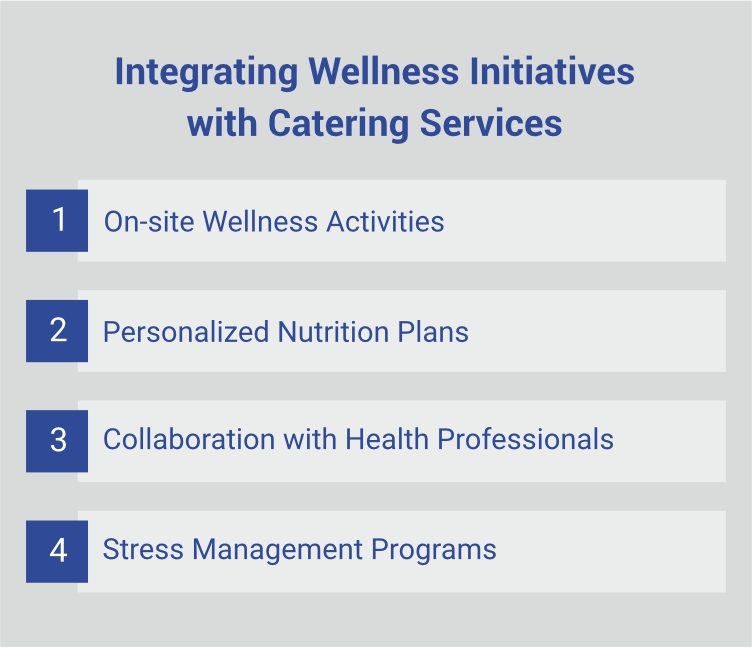Introduction:
In the fast-paced environment of industrial operations, the importance of employee health and wellness cannot be overstated. Health and wellness programs integrated with industrial catering services not only promote healthy eating habits but also enhance overall employee well-being. This blog explores how these programs are reshaping the landscape of Food Services in India, emphasizing the critical role of Catering Services in India in fostering a healthy workforce.
The Importance of Health and Wellness in Industrial Settings
Industrial settings often involve physically demanding work, long hours, and high stress. These factors can lead to poor eating habits and overall neglect of health. Institutional Catering India in has stepped up to address these issues by implementing comprehensive health and wellness programs. Such initiatives are designed to:
- Improve employee productivity and morale
- Reduce absenteeism and healthcare costs
- Foster a culture of health and well-being within the organization
Promoting Healthy Eating Habits
One of the primary goals of health and wellness programs in industrial catering is to encourage healthy eating habits among employees. This is achieved through several strategies:
1. Nutritious Meal Planning:
Catering Services in India is increasingly focusing on providing balanced meals that meet the dietary needs of employees. These meals include a variety of fruits, vegetables, whole grains, lean proteins, and healthy fats. By offering nutritious options, companies can help employees make better food choices.
2. Educational Campaigns:
Food Service providers in India often organize educational campaigns to raise awareness about the importance of healthy eating. These campaigns include workshops, seminars, and informational materials that educate employees on how to maintain a balanced diet.
3. Healthy Snack Options:
Providing healthy snack options in vending machines and cafeterias is another effective strategy. Replacing sugary snacks and beverages with healthier alternatives such as nuts, fruits, and water can significantly improve dietary habits.
4. Portion Control and Calorie Information:
Many industrial catering services now offer portion control and provide calorie information for meals. This helps employees make informed choices about their food intake, promoting better weight management and overall health.
Integrating Wellness Initiatives with Catering Services
Integrating wellness initiatives with catering services creates a holistic approach to employee health. Here are some ways this integration is being achieved:

1. On-site Wellness Activities:
Catering services can be complemented with on-site wellness activities such as yoga sessions, fitness classes, and health screenings. These activities encourage employees to adopt a healthier lifestyle and provide convenient access to wellness resources.
2. Personalized Nutrition Plans:
Industrial food catering in India is increasingly offering personalized nutrition plans tailored to individual health needs. These plans consider factors such as age, gender, medical conditions, and dietary preferences, ensuring that employees receive the nutrition they need.
3. Collaboration with Health Professionals:
Collaborating with dietitians, nutritionists, and healthcare professionals allows catering services to offer expert guidance and support. This collaboration ensures that the meals provided are not only delicious but also nutritionally balanced and aligned with health goals.
4. Stress Management Programs:
Stress management is a critical component of wellness programs. Catering services can play a role by offering meals that include stress-relieving ingredients such as omega-3 fatty acids, magnesium, and antioxidants. Additionally, creating a relaxing dining environment can contribute to stress reduction.
The Role of Technology in Enhancing Health and Wellness Programs
Technology plays a crucial role in enhancing health and wellness programs in industrial catering. Here are some technological advancements being utilized:
1. Mobile Apps and Online Platforms:
Mobile apps and online platforms allow employees to access nutritional information, track their calorie intake, and receive personalized meal recommendations. These tools empower employees to take charge of their health.
2. Wearable Devices:
Wearable devices that monitor physical activity, heart rate, and sleep patterns can be integrated with wellness programs. Catering services can use this data to tailor meal plans that align with employees’ fitness goals.
3. Smart Kitchens:
Smart kitchens equipped with advanced cooking technology ensure that meals are prepared using healthy cooking methods. These kitchens can also monitor food quality and safety, ensuring that employees receive high-quality meals.
3. Data Analytics:
Data analytics can be used to assess the effectiveness of health and wellness programs. By analyzing employee health data, companies can identify trends, measure outcomes, and make data-driven decisions to enhance their programs.
Challenges and Solutions
Implementing health and wellness programs in industrial catering comes with its challenges. However, these challenges can be addressed with strategic solutions:
1. Resistance to Change:
Employees may be resistant to changing their eating habits. To overcome this, companies can offer gradual changes and involve employees in the decision-making process. Providing incentives for healthy eating can also encourage participation.
2. Cost Constraints:
Healthy meals may be perceived as more expensive. However, companies can manage costs by sourcing local, seasonal ingredients and reducing food waste. Investing in employee health can also lead to long-term cost savings through reduced healthcare expenses.
3. Limited Access to Resources:
In some industrial settings, access to fresh and healthy ingredients may be limited. Collaborating with local suppliers and utilizing technology to streamline the supply chain can help overcome this challenge.
3. Measuring Impact:
Measuring the impact of health and wellness programs can be challenging. Companies can use surveys, health screenings, and productivity metrics to assess the effectiveness of their programs and make necessary adjustments.
Conclusion
Health and wellness programs in industrial catering are transforming the way employees perceive and engage with their health. By promoting healthy eating habits and integrating wellness initiatives, Food Catering Services providers in India are playing a pivotal role in enhancing employee well-being. These programs not only benefit employees but also contribute to the overall success and sustainability of organizations. As companies continue to prioritize health and wellness, the future of Institutional Catering in India looks promising, with a focus on creating healthier, happier, and more productive work environments.
Industries we serve:
Automobile | Manufacturing | Pharmaceutical | Oil and Gas | Healthcare | Ancillary | FMCG | Education | Real Estate | Commercial | Mining | Hotels

